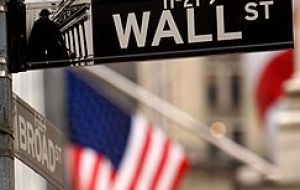MercoPress. South Atlantic News Agency
DJI below 10.000 mark and FTSE 100 falls to 4.589
 Warning in Wall St. and now what?
Warning in Wall St. and now what? Wall Street's Dow Jones Industrial Average fell as much as 800 points to trade below the 10,000 mark Monday as nervousness over the credit crisis spread after the US government's 700 billion USD bailout and interventions in Europe only seemed to add to investor anxiety.
However hopes of a coordinated intervention to stop the losses in global markets helped the Dow (DJI) recoup half of its losses, to close down 369 points, or 3.6%, to 9,955. The blue-chip average earlier fell by as much as 800.06 points, its biggest intraday drop on record. The Dow still closed below the 10,000 mark for the first time since October 26, 2004. The Dow first closed above the 10,000 mark back on March 29, 1999. The S&P 500 fell 42 points, or 3.9%, to end at 1,056 and the Nasdaq Composite lost 84 points, or 3.8%, to finish at 1,862. Crude-oil futures closed at 87.81 US dollars per barrel on the New York Mercantile Exchange, down 6.07, or 6.5%. Treasury bonds rallied along with gold as investors sought safe havens from market volatility. . On Monday, shares in Europe also saw their biggest one-day fall on record, with the pan-European Stoxx 600 index sliding 7.6%. European governments didn't reach a common deal on bailouts over the weekend. Instead each country is handling the fallouts on its own. All 18 West European stock markets were down sharply. London's FTSE 100, which was launched in 1984, fell 391.1 points, or 7.85%, to close at 4,589.2. This means that £ 93.4bn has been wiped off the value of the index's shares. In terms of points, Monday's fall was bigger than the slides seen in the wake of the September 11 attacks on the US and the 1987 stock market crash. Germany's Dax index lost 7.39%, while France's Cac-40 index dropped 9.04% - its biggest one-day fall since the index was created in 1988. Trading on Russia's key stock market was temporarily suspended after share prices plummeted by 10% and 15% respectively. Russia's RTS index ended 19.1% down. The prospect of a slowdown denting energy demand saw oil prices fall further, dipping under 90 USD a barrel. In London Brent crude dropped 6.57 to 83.68 USSD a barrel, while US light, sweet crude fell 6.07 to 87.81 a barrel. The panic selling followed a weekend in which several central banks took action to insure deposits to prevent a run on savings institutions. A German and a Dutch bank were rescued by government action. The Euro, used in 12 European Union countries, fell by a record six percent against the Japanese yen and was down sharply against the U.S. dollar. The US currency is at a 14 month high against the euro at 1.34 while gold soared five percent. Economists are expecting early action to reduce global interest rates as part of a coordinated strategy to keep economies growing. Many experts say the US economy has slipped into recession as the stock market is down 30% from its October 2007 peak and consumer spending is slowing.




Top Comments
Disclaimer & comment rulesCommenting for this story is now closed.
If you have a Facebook account, become a fan and comment on our Facebook Page!